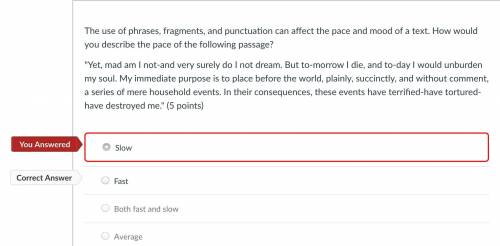
English, 13.11.2019 05:31 chrisholmes176
The use of phrases, fragments, and punctuation can affect the pace and mood of a text. how would you describe the pace of the following passage? "yet, mad am i not—and very surely do i not dream. but to-morrow i die, and to-day i would unburden my soul. my immediate purpose is to place before the world, plainly, succinctly, and without comment, a series of mere household events. in their consequences, these events have terrified—have tortured—have destroyed me."
a) slow b)fast c)fast and slow d)average

Answers: 3


Another question on English

English, 21.06.2019 19:10
Read the passage from sugar changed the world. but there is another story as well. information about sugar spread as human knowledge expanded, as great civilizations and cultures exchanged ideas. in fact, while sugar was the direct cause of the expansion of slavery, the global connections that sugar brought about also fostered the most powerful ideas of human freedom. how do the details in this passage support the authors’ purpose? the details about the expansion of sugar inform readers about how widespread the use of sugar was. the details about human knowledge inform readers about how humans learned about sugar. the details about ideas and global connections persuade readers that sugar’s story has multiple consequences. the details about the spread of information about sugar entertain readers with stories of travel.
Answers: 1


English, 21.06.2019 23:30
The duke and the dauphin lie, cheat, and steal for the purposes of their own survival. answers: •true •false
Answers: 2

English, 22.06.2019 01:00
Read the excerpt from act 1 of a doll's house. helmer: nora! [goes up to her and takes her playfully by the ear.] the same little featherhead! suppose, now, that i borrowed fifty pounds today, and you spent it all in the christmas week, and then on new year's eve a slate fell on my head and killed me, and— nora: [putting her hands over his mouth]. oh! don't say such horrid things. helmer: still, suppose that happened, —what then? nora: if that were to happen, i don't suppose i should care whether i owed money or not. helmer: yes, but what about the people who had lent it? nora: they? who would bother about them? i should not know who they were. helmer: that is like a woman! but seriously, nora, you know what i think about that. no debt, no borrowing. there can be no freedom or beauty about a home life that depends on borrowing and debt. we two have kept bravely on the straight road so far, and we will go on the same way for the short time longer that there need be any struggle. nora: [moving towards the stove]. as you , torvald. how does the interaction between helmer and nora advance the plot? nora realizes that helmer will completely disapprove of her having borrowed money, so she has to continue to keep it a secret from him. nora realizes that she and helmer have the same ideas about financial issues, and the conversation brings them closer together later in the play. helmer realizes that nora is more responsible with money than he originally thought, and he trusts her more with finances later in the play. nora realizes that helmer knows a lot more about borrowing and lending, and she will seek his input later when she needs it.
Answers: 1
You know the right answer?
The use of phrases, fragments, and punctuation can affect the pace and mood of a text. how would you...
Questions

Mathematics, 09.10.2019 01:30

Computers and Technology, 09.10.2019 01:30













Computers and Technology, 09.10.2019 01:30








